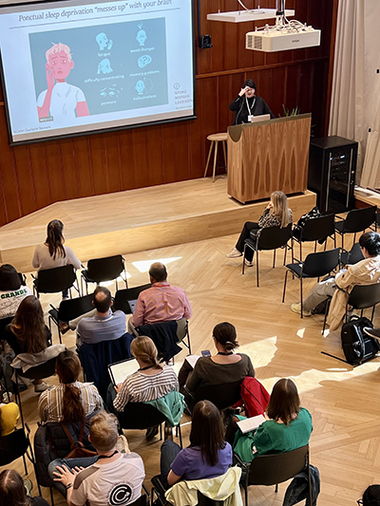The Centre for Molecular Medicine Norway (NCMM) and Simula Research Laboratory (SRL) organized a joint seminar to create an arena for researchers from the two organizations to connect and identify common interests for cross-disciplinary collaborations.
Complimentary skills to advance molecular medicine research
Both organizations see the need to implement artificial intelligence (AI) in molecular medicine research to effectively develop precision medicine. Large amounts of molecular data, as well as a thorough understanding of basic molecular processes are required to address the challenges of precision medicine. For efficient and reliable analysis of such data, AI tools like machine learning can be immensely powerful.
Cross-disciplinary collaborations between Simula and NCMM would allow important steps to be made in implementing AI to advance molecular medicine research. NCMM is a leading research center in Norway aiming to shed light on the molecular mechanisms of health and disease to enable precision medicine. Simula, in turn, is a research institute that performs high-quality information and communication technology research, including machine learning, scientific computing and software engineering.
Director of SRL Research, Joakim Sundnes, noted the complementarity of the two organizations: “Both clearly have overlapping interests, but very different, yet complementary skills. Simula has many method experts in machine learning, while NCMM has a lot of molecular data to learn from. There is clearly much potential for collaborations between the two centers”.
Reciprocal talks to showcase the organizations’ expertise

The event was held over two consecutive half days, with NCMM researchers convening at Simula on the first day and Simula researchers visiting NCMM on the following day.
The first day saw NCMM Director Janna Saarela giving the audiences an overview of the research being done at NCMM and the Nordic EMBL Partnership. This was followed by NCMM group leaders Charlotte Boccara, Biswajyoti Sahu, Anthony Mathelier and Camila Esguerra outlining their research, as well as possible areas where machine learning could enhance their work.
On the second day, participants convened at Oslo Science Park, hosted by NCMM. Here, Joakim Sundnes, introduced Simula Research Laboratory. Next, Simula researchers Mikkel Lepperød, Marie Rognes, Baltasar Beferull-Lozano and Hermengild Arevalo presented their research on machine learning and scientific computing, and how it can be used to study different molecular and physiological processes.
The talks gave the audience an overview of the different research areas of the organiztions and inspired thoughts of possible joint projects. Charlotte Boccara, one of the organizers of the event, expressed that the event had led her to identify several potential partners for collaboration.
Training as a means of knowledge exchange
Wrapping up the two-day event was a panel discussion between four of the speakers from the two organizations. Here, they discussed ideas for how to further develop cross-collaboration and explore new connections.
The panelists agreed that a focus on training was an integral part of both research institutes, and something the centers could reciprocally capitalize on. This led to fruitful discussions on how to actively promote knowledge exchange, including co-supervision of students and joint courses in AI and molecular medicine.
The seminar concluded with NCMM and Simula committed to building on the connections they have now established, to advance molecular medicine research and the development of precision medicine.
